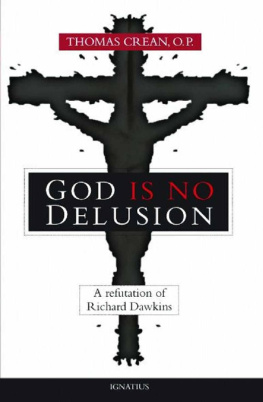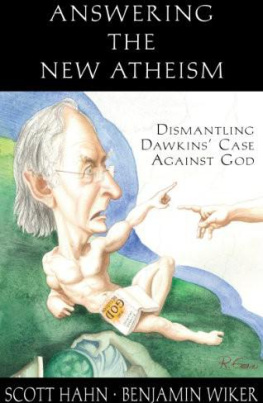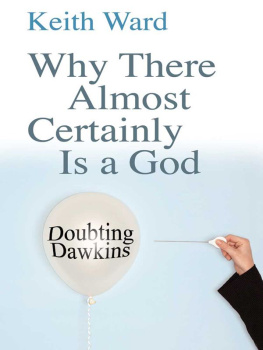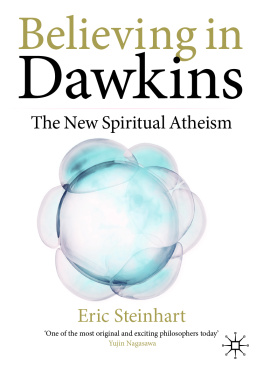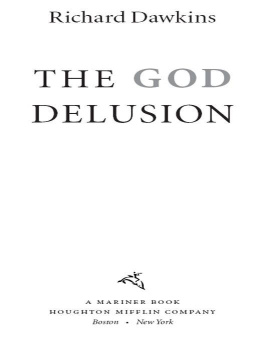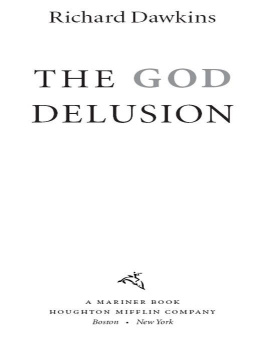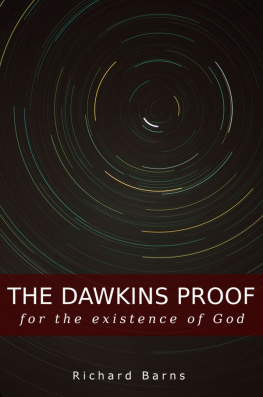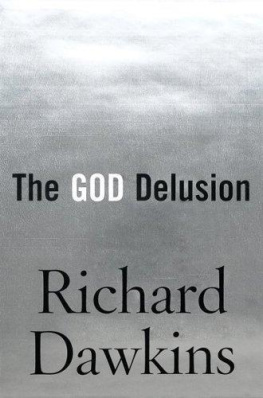GOD IS NO DELUSION
For my mother and my father
Thomas Crean O.P .
_______________________
GOD IS NO DELUSION
A Refutation of Richard Dawkins
A magnitudine enim speciei et creaturae
cognoscibiliter potent horum creator videri .
For by the greatness of beauty and of
the creation, the Creator of them may be seen,
so as to be known thereby.
Wisdom 13:5
IGNATIUS PRESS SAN FRANCISCO
2007 Family Publications, Oxford
All rights reserved
Reprinted in the U.S.A. by permission of Family Publications
Cover design by John Herreid
Published in 2007 by Ignatius Press, San Francisco
ISBN 978-1-58617-231-2
Library of Congress Control Number 2007933599
Printed in the United States of America
Contents
Preface
This book is a reply to Professor Richard Dawkins recent attack on religion. Professor Dawkins is an opponent of all religions. This book, however, is not a defence of all religions: it would not be possible to write such a defence, since the various religions of the world are incompatible with each other. It is a defence of two things. First, it is a defence of theism: not merely an argument that one may reasonably believe in God, but an account of why our authors philosophy, atheism, is false. Secondly, it is a defence of the particular religion to which I adhere, namely, Catholicism (the same religion, incidentally, that founded and named Professor Dawkins own college). It is not, however, a systematic apologia for Catholicism, simply a reply to the various charges that the author alleges against us.
The first two chapters of this book are more philosophical and therefore slightly more abstruse than the succeeding ones. This is unavoidable, given their subject: the possible cause or causes of our visible universe. Still, though they may require closer attention than the other chapters, I hope that they will be accessible to the general reader. On the other hand, I have not attempted to anticipate all the philosophical questions that might be raised about my arguments, for example, how the universal causality of God is compatible with free will or with sin. To have done so would have taken this work too far from its goal: the rebuttal of Professor Dawkins attacks.
St Thomas Aquinas once observed that when opponents of our faith do not recognize the authority of any part of our holy scriptures, our unique recourse must be to natural reason, to which all are bound to assent. It is in this spirit that I offer the following pages.
Thomas Crean O.P .
Passiontide 2001
Chapter 1
PROFESSOR DAWKINS
ARGUMENT
P rofessor Richard Dawkins, the eminent biologist, has written a book purporting to show that belief in God is a delusion. I do not think it would be unfair to say that his book contains only one argument for this conclusion. Of course, it contains many other statements about religion, as also about morals, biology, physics, anthropology and childrens education. But it seems to offer only one argument for atheism. This is the argument I shall examine in my opening chapter.
Preliminaries
What does Professor Dawkins mean by God? He summarizes what he chooses to call the God Hypothesis as follows: There exists a super-human, supernatural intelligence who deliberately designed and created the universe and everything in it, including us (p. 31). A Catholic has no fundamental quarrel with this way of stating the question. True, for reasons of reverence we should not normally speak of God as simply an intelligence, but rather as the supreme intelligence, or as intelligence itself. But this is a relatively minor point. Again, though acknowledging that God is super-human, in the sense of more perfect than mankind, we do not normally use this word of him, since it is insufficiently precise. Angels, too, are super-human, yet they are not God (Professor Dawkins, of course, may not believe in angels: but this is beside the point). Similarly, the exact sense of the word supernatural in this definition is unclear. If it simply means what is superior to the reality perceptible to bodily senses, it again applies to God, but not to him alone. Angels, as pure minds, are imperceptible in principle both to our sense-organs and to those of all other bodily creatures. For these reasons, we might prefer to replace the Professors summary of theism with the following: The whole universe, including ourselves, was designed and created by the supreme and uncreated intelligence, whom we call God. However, for present purposes, nothing significant turns on these different ways of stating the question.
An argument from complexity
I have claimed that Professor Dawkins offers only one philosophical argument for atheism. It could be called the argument from complexity. His idea is this: if a being existed with the attributes generally said to belong to God, such a being would be complex, and therefore would require a cause. He writes:
A designer God cannot be used to explain organized complexity because any God capable of designing anything would have to be complex enough to demand the same kind of explanation in his own right, (p. 109)
Professor Dawkins is saying to us, in effect, Do you think that because the universe is so complicated, God must have designed it? But just think how complex God must be if He could have designed the whole universe! Who designed Him, then? Better to say the universe had no designer after all.
How should we answer this? Before offering a more serious reply, we could point out that even were this argument sound, it wouldnt invalidate the authors own summary of the God Hypothesis. This hypothesis was that our universe has been designed by an intelligence distinct from itself. The argument from complexity would not prove that there was no such intelligence. Were it sound, it would simply show that any such intelligence must have a cause which was not itself intelligent. And that intelligence may arise from non-intelligent causes, is, of course, one of the main tenets of our authors Credo .
However, this is something of a debating point. For our author might naturally reply that theists consider it essential to the notion of God that He is the First Being . Therefore he could state his case more carefully in these terms: God is supposed to be both the intelligent designer of the universe and also the first being; but any intelligent designer of the universe would be so complex as to require a cause outside itself; therefore there can be no God who is both an intelligent designer and also the first being.
Assessing the argument
The Catholic philosopher will wholeheartedly agree that complexity always demands an explanation. Whenever different things are joined together, whether the atoms in a water molecule or the various thoughts in the mind of a philosopher, some explanation of the joining together is always needed. Complexity is not self-explanatory. Professor Dawkins was once invited in a newspaper interview to complete the sentence In the beginning was...; he replied with the word simplicity. St Thomas Aquinas would have approved of this answer.
But why does our author claim that no designer of the universe could be simple? No proof of this proposition is attempted. It is put forward rather in the manner of a self-evident truth. Reading between the lines, however, one can discern in the authors mind two relevant considerations, one drawn from the natural world, the other from the world of information technology. The following is a fairly typical remark:
God may not have a brain made of neurones, or a CPU made of silicon, but if he has the powers attributed to him he must have something far more elaborately and non-randomly constructed than the largest brain or computer we know, (p. 154)
One could draw out the argument as follows. In the natural world, the more complex a product is, the more complex will its producer be. Men build cathedrals, which are very complex; birds, endowed with smaller brains than men, build nests, which are considerably simpler than cathedrals; single-celled organisms build neither cathedrals nor nests. Therefore, the universe, being the most complex of all visible things, must have been built, if at all, by a being much more complex than a man.
Next page
